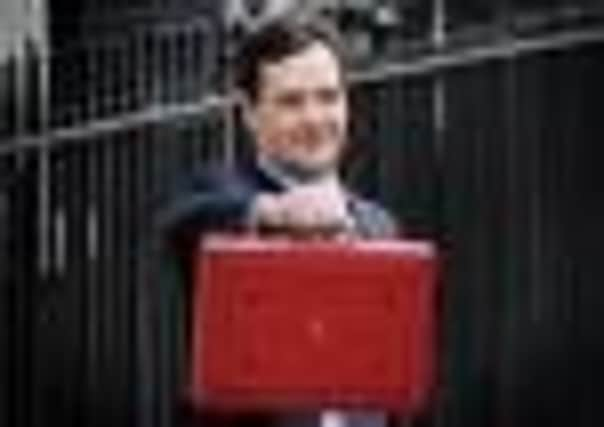Business leaders hail decision to cut rate of corporation tax


In a heavily-trailed Budget, George Osborne confirmed plans to reduce the main rate of corporation tax by an additional one per cent to 24 per cent next month.
He said Britain will have a 22 per cent rate of corporation tax by 2014, “the biggest sustained reduction in business tax rates for a generation”.
Advertisement
Hide AdAdvertisement
Hide AdMr Osborne said the UK will have headline rate “that is not just lower than our competitors, but dramatically lower”, which will act as “an advertisement for investment and jobs in Britain”.
The Confederation of British Industry’s director general John Cridland said the move “will help make the UK a more attractive place for companies to invest, do business and create jobs”.
He added: “An extra one per cent off corporation tax this year could make a big difference to investment intentions.”
Jonathan Straight, chief executive of Leeds-based recycling firm Straight plc, said: “The less corporation tax we pay, the more we can retain in our business to grow the business with, so clearly that’s a good thing.”
Advertisement
Hide AdAdvertisement
Hide AdElsewhere in Yorkshire, business groups were more sceptical.
Richard Wright, executive director of the Sheffield Chamber of Commerce, said: “The problem is that this one per cent cut hardly equates to the imminent increases in business tax of 5.6 per cent and lower allowances in capital investment, so overall things will get more difficult.
“I suspect a lot of small and medium businesses will feel there is less in this budget for them and more for the larger companies.
“I am not sure the Budget will increase confidence enough to get finance and investment flowing, and the economy growing.”
Advertisement
Hide AdAdvertisement
Hide AdMargaret Wood, chairwoman of the Institute of Directors in Yorkshire, said the reduction of corporation tax and the top rate of income tax from 50p to 45p will help many, but her members want cuts to employers’ National Insurance contributions.
Kenton Robbins, regional director of the IoD, said this move “would have been the spur they need to allow them to employ more people and help reduce the burden we are all feeling of unemployment”.
“Generally it is a good budget for business but it doesn’t go far enough,” he added.
The Chancellor promised to introduce an “above the line” tax credit to encourage more research and development activity by larger companies. Advisers said the proposal will make it easier for businesses to factor tax breaks into their budgets.
Advertisement
Hide AdAdvertisement
Hide AdStuart Cottee, head of tax in Leeds, said reforms to the way that controlled foreign companies are taxed, reduced tax on profits from patents and improvements to R&D tax credits will make the UK more attractive to businesses.
He added: “What the Chancellor is trying to do is make the UK a place where companies want to employ people, bring business and develop new intellectual property.
“The Government collects a lot more money through payroll than it ever will through corporation tax. It’s all about encouraging business to make bases here in this country.”
Mr Osborne also announced plans to expand the UK export finance guarantee scheme to help the nation double exports to £1 trillion pounds this decade.
Advertisement
Hide AdAdvertisement
Hide AdLen Cruddas, speaking for the Leeds, York and North Yorkshire Chamber of Commerce, welcomed the move, although “there must be better promotion of this to both businesses and banks to improve take-up”. Leeds firms underperform national rivals in international trade.
Ian Stewart, Deloitte chief economist, said the Budget had a “spring-like feel to it”, but he warned that the UK faces “a long haul ahead” with the majority of public spending cuts still to come.